CIA Sponsored Terror, Civil Liberties, Criminalizing Dissent, Death Penalty, Guantanamo, Human Rights, NSA Spying, Political Prisoner, Surveillance, Torture, Truth to Power
Podcast: Play in new window | Download
Updates:
Michael Ratner: Is Congress’ Decision On Obama’s Plan To Close GTMO Really A Setback As Newspapers Report?
- Congress was considering whether to allow Guantanamo detainees to be resettled in the United States.
- That’s something Obama wants to do because so far he’s been unwilling to settle them in other countries.
- That bill failed and so when we get the NDAA or whatever legislation it will be put in, it will have transfer restrictions of a sort but it will not permit detainees to be transferred to the United States.
- Obama has had 6 years to make good on his promise that he would close Guantanamo in a year.
- Guantanamo remains, more than 142 people. More than half 73, have been cleared for release.
- On January 11, 2015, I urge all of us to get in the streets demonstrate and tell Obama to shut it down.
——-
Michael Ratner: The Right Livelihood Awards In Stockholm, Sweden
- I just came back from Stockholm, Sweden where the Right Livelihood Awards, also known as the alternate Nobel Prize are given out annually.
- Amy Goodman has received such an award. This time there were five awardees.
- One of whom is Edward Snowden. That was one of the reasons I was there because who are involved in defending protecting whistleblowers were in Stockholm for that award.
- The awards are not given by the Swedish government. Sweden is not a progressive government. It’s tied with Israel as the 3rd biggest arms dealer in the world.
- Sweden did recognize that Palestine should be a state.
United Nations Committee May Question U.S. Officials On Handling Of Michael Brown Shooting
——-
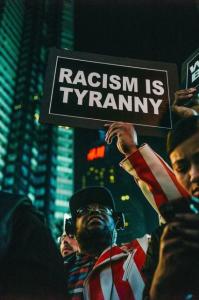

Ferguson: It is Right to Resist, By Any and All Means Necessary
Two weeks after the non-indictment of former officer Darren Wilson over the killing of Michael Brown, protests continue nationwide from classrooms to places of work. Will a genuine movement gain traction in the wake of outrage and defiance to the grand jury decision? A movement coalescing against police violence will need to confront police, and resist the legitimacy of the state writes Glen Ford founder of the Black Agenda Report. He says the people of Ferguson’s mass violations of the curfews and countless decrees of the militarized city, county and state police were, by definition, illegal acts – which is what made the small town a model of resistance.
Glen Ford:
- Not to belittle all the work people have put into this. There’s been a pent up energy that has been building and I mean for literally decades. We have to compare this explosion as you call it of activism to the period of quietude for decades even as the contradictions that led to Michael Brown’s murder and a multitude of murders kept on becoming more acute.
- We have to understand that there were forces that were keeping a lid on the explosion, and finally those forces could no longer do so and we see the explosion in 170 or more cities.
- Black folks have never trusted the police and never had any reason to trust the police. It’s never been about trust its been about power. The power of a community to protect its youth, its sons and daughters from being gunned down on the streets by these police or sucked up into the mass black incarceration machinery.
- The helplessness has not been something inherent to black folks its because we’ve had a kind of fifth column in our midst that we at Black Agenda Report call the black misleadership class which has engaged in very enthusiastic collaboration with the same people who created this black mass incarceration state.
- Back in June there was a vote in the house and the senate on a bill that would’ve prevented the Pentagon from transferring its weaponry and all of its militarized gear to local and state police departments.
- Four out of five Congressional Black Caucus members either voted against that bill or abstained. 32 out of the 40 members, so 80 percent of the Congressional Black Caucus. I guess its fitting that they stand in for this black misleadership class. They were financing the murder of people like Michael Brown.
- So, this is our problem, that these are the people that keep the lid on.
- What should be an ongoing, not simmering distrust, but an ongoing explosion of resistance.
- All of this started in terms of legislative form with the Law Enforcement Assistance Administration that was part of an omnibus crime bill that was passed in 1968 signed by Lyndon B Johnson which began by transferring massive federal resources to local police departments.
- It’s been gradual, steady and now institutionalized.
- This is the movement that does not yet have a name and it doesn’t have a name because its not yet clear about its objectives.
- The response to this civil rights and black power movement was the mass black incarceration state.
- Community control of the police and its a very very difficult subject. It was the subject that the Black Panther Party was born to tackle.
- The community should be empowered to fire police, just like communities are being empowered through their mayor to fire teachers.
- This movement can’t treat police as legitimate, that is coercive mechanisms of the state.
- Their police, their security apparatus, their intelligence apparatus has to be seen and opposed as illegitimate.
- He’s always in a huddle with President Obama (Al Sharpton) and that’s why I call him “king rat.”
- The real ratting that he does is that he goes across the country and he makes an assessment of who is in opposition to the administration’s policy or mass incarceration order and then goes right back to the commander and chief of the regime and tells him who might be creating trouble and how those troublemakers can be neutralized. That’s the real rat.
- Mass arrests and provocateurs and such. This is what Sharpton’s really talking about when he talks about the full weight of the president’s office.
Guest – Glen Ford, founder of the Black Agenda Report and many other media forums. Ford was a founding member of the Washington chapter of the National Association of Black Journalists (NABJ); executive board member of the National Alliance of Third World Journalists (NATWJ); media specialist for the National Minority Purchasing Council; and has spoken at scores of colleges and universities.
——-

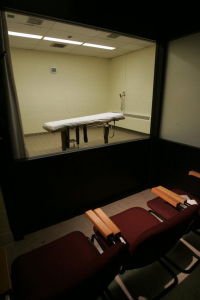
Ohio Republicans Push Law to Keep All Details of Executions Secret
Republican lawmakers in Ohio are rushing through one of the most extreme secrecy bills yet attempted by a death penalty state. It’s called HB 663 and it withhold information on every aspect of the execution process from the public, media and even the courts. Ohio has experienced four botched executions in eight years. The most recent was the 26 minute death of Dennis McGuire in January 2014. An experimental two-drug combination was used and it was reported that Dennis was gasping and fight for breath. Another aspect of HB 663 is that seeks to undermine strict distribution controls that have been placed on foreign companies that manufacture pentobarbital.
Attorney Mike Brickner:
- They’re really trying to ram through the last few weeks of our lame duck session.
- I think they want to resume executions here in the state of Ohio in 2015.
- We’ve had a moratorium on executions since the beginning of 2014 when we had a botched execution of Dennis McGuire and the federal court has been trying to come with new protocol, new drugs that won’t lead to a botched execution.
- I think the legislators want to move forward with the next scheduled execution in February so they’re trying to push it through as quickly as possible.
- I think they’re interested in secrecy because of all the controversy that has plagued Ohio executions over the last decades.
- I think this a natural concern from the government – when something is not going well, they want to hide it from the public.
- Unfortunately that never really works out well for the government because when you operate in secret, the only things that follow are corruption, abuse, negligence and incompetence.
- The legislation would shield anyone who really touches the lethal injection process from public records laws.
- For those medical professionals who advise or assist on the executions, it would prevent the state licensing board from holding them accountable for violating their oath.
- Unfortunately bad ideas often travel quickly. We have five states with secrecy legislation of some sort in place, we have 15 states that tried to enact secrecy legislation.
- Compounding pharmacies are smaller companies, often one or two pharmacists. They make small batches of drugs made to order. They’re not regulated in any meaningful way by the FDA.
- When they make these drugs in small batches, one batch could be more effective or less effective than another batch. When you’re talking about a lethal injection where you need to insure a humane and constitutional way, if you have a drug that’s being used in the lethal injection process that’s not effective, you have a very high chance of that person going through an execution that will violate our constitution.
- We have to accept that the death penalty does exist in states like Ohio and if we are to have the death penalty then we need to make sure that it complies with our laws and that those who are subjected to the death penalty are not treated inhumanely and in a way that will violate our constitution.
- I think we can do that while moving toward abolishing the death penalty.
Guest – Attorney Mike Brickner, senior policy director of the American Civil Liberties Union (ACLU) in Ohio. Brickner recently opposed the new bill in front of a committee at the Ohio State legislature. In 2013, Mike co-authored two reports focusing on the intersection of poverty and the criminal justice system. The Outskirts of Hope: How Debtors’ Prisons are Ruining Lives and Costing Communities chronicled how courts were illegally imprisoning low-income Ohioans because they could not afford to pay their fines. The report culminated in the Ohio Supreme Court increasing education and training for court personnel and issuing bench cards with clear rules for collecting fines and court costs. He also co-authored and designed the ACLU’s April 2011 report, Prisons for Profit: A Look at Private Prisons. The report highlights the problems faced by other states who have privatized prisons, including: increased costs, safety problems, a lack of transparency, and increased recidivism.
—————————————————————————–

Please help support Law and Disorder by clicking on Fractured Atlas graphic (link is fixed). This radio show is now a sponsored project of Fractured Atlas, a non-profit arts service organization. Contributions for the charitable purposes of Law and Disorder must be made payable to Fractured Atlas only and are tax-deductible to the extent permitted by law. You can donate as little as 5.00 a month.
Afghanistan War, CIA Sponsored Terror, Civil Liberties, Criminalizing Dissent, Guantanamo, Habeas Corpus, Human Rights, Prison Industry, Targeting Muslims, Torture, Truth to Power
Podcast: Play in new window | Download
Updates:
- Michael Ratner: U.S. President Barack Obama To Seek Additional War Powers From Congress
——
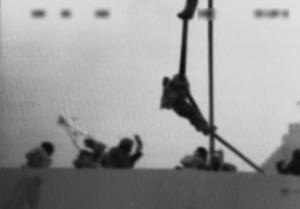
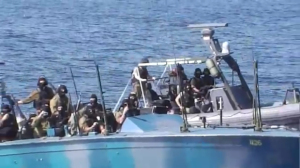
ICC Says Gaza Still Occupied, Israel May Have Committed War Crimes, But Court Refuses To Hear
Attorney Michael Ratner:
- When I’m in Berlin I see there’s a ICC decision by the prosecutor.
- People probably remember the attack on the Gaza flotilla, particularly the Mavi Marmara. One of 8 boats that were sent from Europe and other places, Turkey, to try and break the blockade that Israel had imposed on Gaza.
- Israel has been blockading Gaza forever essentially but it put in a very serious naval blockade in 2009 and no boats from the Mediterranean could approach within 20 miles of what Israel called its blockade.
- The Gaza Flotilla was established in 2010 to try and break the blockade it had 8 ships, one was named the Rachel Corrie.
- They were at least 80 miles away from Gaza, hadn’t even got into the blockaded territory when the Israeli commandos, the IDF made a raid on those boats.
- Particularly on the Mavimarmara which was a Turkish boat – the fact that the boat was registered in Comoros gave the ICC jurisdiction over the raid.
- People may recall the raid. Israeli commandos shimmied down on ropes from helicopters on to the Mavimarmara and they killed 9 people. A tenth died later.
- Ultimately, Comoros made a complaint to the ICC that – Israel attacked this flotilla even outside the 20 mile blockade zone, they committed war crimes. War crimes in that they were attacking civilian boats. War crimes in that they were killing civilians.
- Here I am sitting in Berlin thinking about the 76 anniversary of Kristallnacht, the tearing down of that wall, Raji Sourani from Gaza not being able to get in, and this ICC decision comes down.
- The ICC prosecutor says there’s a reasonable basis that war crimes were committed by the IDF in their attack on the Gaza Flotilla.
- The next sentence said as part of that finding Gaza was an occupied territory of Israel. That’s of great significance because when you’re an occupying force the laws of war apply. If you commit war crimes, if you kill people – civilians or intentionally targeting them or attack civilian objects.
- The third sentence is while we find that there was a reasonable basis that the IDF committed war crimes and that Israel continues to occupy Gaza despite its claim in 2005 that it left Gaza we are not going to take jurisdiction and further investigate the case, because the crimes were not essentially severe enough, big enough, enough of them . . . and therefore we’re not going to take this case.
- To look at them in an isolated way and not part of a stream of war crimes Israel has been committing since 1948 is outrageous.
- The Situation on Registered Vessels of the Union of the Comoros, the Hellenic Republic and the Kingdom of Cambodia
Law and Disorder Co-host Attorney Michael Ratner, President Emeritus of the Center for Constitutional Rights (CCR), a non-profit human rights litigation organization based in New York City and president of the European Center for Constitutional and Human Rights (ECCHR) based in Berlin. Ratner and CCR are currently the attorneys in the United States for publishers Julian Assange and Wikileaks. He was co-counsel in representing the Guantanamo Bay detainees in the United States Supreme Court, where, in June 2004, the court decided his clients have the right to test the legality of their detentions in court. Ratner is also a past president of the National Lawyers Guild and the author of numerous books and articles, including the books Who Killed Che? How the CIA Got Away With Murder, The Trial of Donald Rumsfeld: A Prosecution by Book, Against War with Iraq and Guantanamo: What the World Should Know, as well as a textbook on international human rights.
———

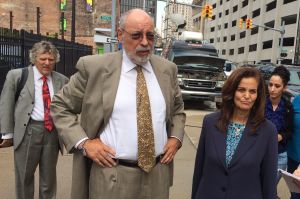
U.S. Government Finds 67-year-old Palestinian-American Rasmea Odeh Guilty
Earlier this summer we reported on Rasmea Odeh’s case. She’s a 67 year-old Palestinian American, community activist and teacher. In the fall of 2013, she was arrested by Department of Homeland Security for failing to disclose a 1969 conviction in an Israeli military court and charged with unlawful procurement of naturalization. Odeh, her father and fiancee were brutally tortured in an Israeli prison in 1969, which was related to a bombing in a Jerusalem supermarket. Israelis extracted a confession from Odeh and she spent 10 years in an Israeli prison where she was tortured and sexually assaulted.
Last week, Rasmea Odeh was found guilty of one count of Unlawful Procurement of Naturalization. For over a year, Rasmea, her supporters, and her legal team have been battling this unjust government prosecution, saying from the start that the immigration charge was nothing but a pretext to attack this icon of the Palestine liberation movement. And although there is real anger and disappointment in the jury’s verdict, it was known as early as October 27th that she would not get a full and fair trial, because Judge Gershwin Drain made it nearly impossible for her defense.
Attorney Michael Deutsch:
- This case emanates from the FBI and the US Attorney in Chicago investigating the work of the Arab American Action Network and other people who were doing Palestine solidarity work in the Chicago area and throughout the Midwest.
- They were bringing speakers here from Palestine to educate people
- As a result of that work they were targeted by the FBI. Ultimately in September of 2010, the homes 7 activists were invaded. All their political material was taken. There was a Grand Jury that convened and 23 activists were subpoenaed and they also sought the records of the Arab American Action Network.
- The U.S. Attorney of Chicago sent a request to Washington to look into the records of Odeh in Israel.
- After several years, the Israelis came up with documents that showed she was arrested in 1969, put on trial by a military tribunal in the Occupied Territories.
- . . found guilty, horrifically tortured, confessed as did her co-defendants, sentenced to life in prison, put in an Israeli prison, tried to escape in 1975, caught in a tunnel, trying to get out.
- As a result of this they looked at her Naturalization application and saw that she said no as to whether she had ever been arrested, convicted or in prison and the commenced a criminal investigation and indicted her 9 years after she had gotten her citizenship. Months before a statute of limitations would have run on this charge.
- We put forward a multi-level defense. One, we said that anything that was produced by the military court, the military judicial system was illegitimate, illegal – you’re tried by soldiers posing as judges. We said that she had been horrifically tortured and we had someone evaluate her over many days and hours, this woman who is one of the leading experts on torture said she (Rasmea) still suffers from PTSD.
- That would have caused her when she filled out the application to cognitively block what had happened to her 40 years prior in Israel and therefore she wasn’t intentionally lying.
- The judge refused all our motions, all our defense. He wouldn’t let her (Rasmea) testify about her torture, about her condition, or her innocence. All that was blocked by motions of the government.
- We went to trial basically with our hands tied behind our backs.
- What was a shock to me was the judge locked her up, pending sentencing. Now she sits in a county jail in Port Huron, Michigan for five months before the sentencing and obviously if the judge is not going to give her bail pending sentencing, he’s not going to give her bail pending appeal.
- Judge Gershwin Drain who is African American who at first was kind of sympathetic and supportive and initially said we were allowed to put on our PTSD expert and put on a PTSD defense. Then all of a sudden the government put a move to reconsider, he changed his mind and basically gutted our trial.
- We know of efforts all over the country to suppress student activity (around issues of Israel – Palestine)
- We have to convince the judge to let her out on an appeal bond. Even after all that if she’s sentenced, she’s going to go to prison and then when she’s done with her prison sentence, they’re going to put in her into immigration prison and they’re going to deport her.
Guest – Attorney Michael Deutsch, after clerking for United States Court of Appeals Judge Otto Kerner, Mr. Deutsch went into private practice, joining People’s Law Office in 1970 where he has represented political activists and victims of police and government civil rights violations. His advocacy has taken him all around the world, including to hearings in the United Nations. He has tried many civil and criminal cases in federal and state courts, and has written and argued numerous appeals, including several in the United States Supreme Court.
—–

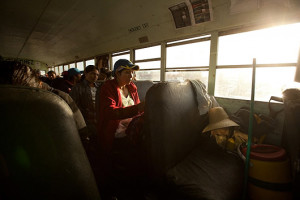
Food Chains Documentary Film Opens Nationwide This Week
The documentary film Food Chains opens nationwide in the United States this month. The film brings you into the world of a Florida farmworker led effort to hold responsible the 4 trillion dollar global supermarket industry. The CIW is doing so through the Fair Food program. That’s the program which partners growers and retailers to improve working conditions for farm laborers in the United States. For years, farmworkers often endure abuse, wage theft, and have been beaten and sexually harassed. Food Chains’ producers include Eva Longoria and Eric Schlosser. Find out about screenings and action to take at www.ciw-online.org
Saturday November 22 – 1:00pm: Screening of Food Chains & Post-film Panel CIW-Quad Cinema (34 W 13th St) Food Chains also playing on Sat. Nov 22 at 7:45pm
Protest & March to Wendy’s Meet at Union Square Wendy’s (20 E. 14th St) Facebook
Guest – Gerardo Reyes Chavez, has worked in the fields since age 11, first as a farmer in Zacatecas, Mexico, and then in the fields of Florida picking oranges, tomatoes, and watermelons. He joined the Coalition of Immokalee Workers, a Florida-based human rights organization, shortly after his arrival in the United States in 2000, when his fellow farm worker roommates, who had previously escaped a violent slavery operation hidden in the swamp south of Immokalee, Florida, invited him to come to the CIW’s Wednesday evening community meetings.
——————————————————————————

Please help support Law and Disorder, the show is now a sponsored project of Fractured Atlas, a non-profit arts service organization. Contributions for the charitable purposes of Law and Disorder must be made payable to Fractured Atlas only and are tax-deductible to the extent permitted by law.
Afghanistan War, CIA Sponsored Terror, Civil Liberties, Criminalizing Dissent, Habeas Corpus, Human Rights, Iraq War, NSA Spying, Political Prisoner, Prison Industry, Surveillance, Targeting Muslims, Torture, Truth to Power, War Resister
Podcast: Play in new window | Download
Updates
- Michael Ratner Reports On An Important Break In The Julian Assange Case
- Michael Ratner: Longest Case Of Pre-Trial Investigation In Swedish History In Which The Prosecutor Has Simply Sat On Her Hands.
- Michael Ratner: What Sweden Did Here Is Divert Attention From The Underlying Problem
- Michael Smith: United Nations And The Cuban Embargo Vote 2014
- Michael Ratner: Israeli Business Men Are All Over Cuba
——-

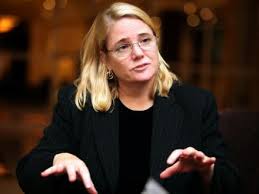
Blackwater Guards Found Guilty in 2007 Baghdad Killings
Since 2003, private military contractors have been awarded millions of dollars each year by the U.S. Government in contracts. Many of the military contractor personnel have engaged in atrocious war crimes with zero accountability. Last week a federal jury convicted 4 former Blackwater private security contractors on manslaughter charges and 1 for manslaughter and murder of 17 Iraqis in Baghdad on September 16, 2007. The men were prosecuted under the Military Extraterritorial Jurisdiction Act, a law that allows the U.S. courts to hear cases against contractors to the U.S. Department of Defense for crimes committed overseas. The men were originally hired as private security guards for U.S government employees. Lawyers for Blackwater, now known as Academi LLC argued that the men were simply returning fire to protect themselves.Several civil cases filed by victims injured in the shootings were settled in 2010.
Attorney Susan Burke:
- I think the verdict sends a very loud and large message to the globe that the American judicial system can operate properly.
- That American juries understand when they see war crimes, they understand when they hear about a massacre.
- We began working before the Abu-Ghraib photos were leaked. It began when Bob Woodward wrote a story for the Washington Post that revealed that the Bush Administration had decided to use torture as an instrument in the war.
- We viewed this outsourcing as a potential weak flank in a sense in order to use legal mechanisms, lawsuits in order to prevent this country from departing with its values.
- We were putting the evidence together before the photos leaked and suddenly we had a lot more evidence to sue the 2 government contractors L3 and CACI that were involved in the Abu-Ghraib torture.
- The Blackwater case fits into that rubrick where we brought several different law suits along with the Center for Constitutional Rights. We brought the seven law suits for the victims of the Nisour Square massacre as well as for many other victims.
- If you think about we’re going to the home turf of the wrong doers. The corporations are based in Virginia actually, and so we sued them in their home turf.
- There’s one (civil) case remaining that’s now being handled by Baher Azmy at CCR and they just got a win from the Fourth Circuit – again getting permission for the case to proceed.
- The vast majority of victims have settled with L3 paying 5.25 million.
- Blackwater is a mercenary company that basically earned over a billion dollars from the State Department.
- They were not at Abu Ghraib rather they were providing security for all of the diplomats and other Americans in Iraq.
- At the time they were owned by Erik Prince, operated without any oversight from the State Department and they were involved with a significant number of instances were unnecessary and excessive force was used.
- Erik Prince ended up entering into a settlement and all of those folks obtained compensation.
- Prince then sold the company, retained a revenue stream but the company became Academi.
- As a nation we continue to use these mercenaries and we continue to lack any regulation or oversight. Unfortunately, things didn’t change under the Obama Administration and under Secretary Clinton at the State Department
- What’s happened is there’s this terrible pattern where these companies have a lot of political influence and they continue to get enormous contracts and the State Department continues to outsource security without have a vibrant, or robust oversight function.
- Blackwater vehicles rolled into Nisour Square and they began to open fire with heavy automatic weaponry and they simply began to spray indiscriminatly. They began to shoot all over Nisour Square killing people nearby and injuring people as they fled. No provocation, no real reason they began shooting.
- One of the Blackwater men, a man named Jeremy Ridgeway actually stepped and told the truth early on, pled guilty and explained how this was in fact just indiscriminate shooting for no reason.
- In order to properly handle these matters I ended up creating my own firm.
Guest – Attorney Susan Burke, represented plaintiffs in those civil cases and she joins us today to talk about criminal case, the sentence and the supporting evidence.
——
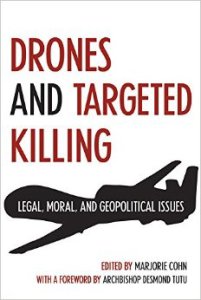

Drones and Targeted Killing: Legal, Moral and Geopolitical Issues
A powerful analysis on the use of drones for targeted assassination by the Obama Administration is explored in Professor Marjorie Cohn’s newly published book titled Drones and Targeted Killing: Legal, Moral, and Geopolitical Issues. It’s a collection of various disciplines including sociologists, legal scholars, and human rights activists that examine aspects of the U.S. policy of targeted killings with drones and other methods. The book documents civilian casualties, and discuses the first U.S. targeted killing lawsuit by the lawyer who brought the case.
Attorney Marjorie Cohn:
- Drones have become the Obama Administration’s preferred weapon of choice.
- We rarely see images of the victims of drone strikes the overwhelming majority of whom are civilians.
- We don’t hear their stories because the media sanitizes their stories.
- We really don’t have a sense of the devastation that is reeked by drones.
- I thought it was important to put together a collection of different aspects of this drone policy. Is it legal? Is it moral? What are the political ramifications? Does it make us safer? Does it make us less safe?
- That Authorization for the Use of Military Force was very limited, it was only limited to groups and countries that supported the 911 attacks and Congress specifically rejected the Bush Administrations request for open ended military authority to deter and preempt any future acts of terrorism against the United States – and yet the Obama Administration has been relying on this as its legal authority.
- Targeted extrajudicial killings off the battle field are illegal.
- Richard Falk, the U.N. Special Rapporteur to the Palestinian Occupied Territories wrote a very and interesting and provocative chapter called Why Drones Are More Dangerous Than Nuclear Weapons.
- Medea Benjamin talked about stories of victims in Pakistan and Yemen and the tolls drones take on communities. The horror, the terror that children are sleeping with drones hovering overhead.
- Pardiss Kebriaei with the Center for Constitutional Rights that handled the first targeted killing case in the United States writes a chapter.
- Tom Hayden writes the conclusion about stopping the drones.
- Phyllis Bennis from the Institute of Policy Studies talks about the assassination as essential to the U.S. war strategy due to the militarization of our foreign policy.
- John Quigley from Ohio State University talks about the blowback from drones and how they actually make us less safe because when people see their families blown up, they resent the United States even more.
- He talks about the history of U.S. foreign policy and the resentment its caused in those countries against the United States.
- He (Barack Obama) has even expanded the use of drones in Iraq and Syria. He’s also using piloted aircraft. He’s also using the AUMF which does not apply at all.
- This ISIS and Khorasan, the current groups doing horrible things over there are not covered by the Authorization for the Use Of Military Force.
- He’s actually acting beyond what Congress has authorized to say nothing of it violating the U.N. charter.
- Only 4 percent of victims in Pakistan were members or even associated with Al-Qaeda which means the overwhelming number of 2400 who have been killed in Pakistan by drone strikes are civilians.
- The FAA Modernization and Reform Act of 2012 requires the FAA to integrate into U.S. airspace by September of 2015 to legalize commercial drones and some government agencies to use small drones. This is very very worrisome because of the privacy considerations primarily.
- There are two different drone strikes the U.S. carries out. One is called personality strikes, where they target suspected bad guys. They call them militants. That could mean anything.
- No due process, just take em out.
- The other type of attack is called signature strikes. That is a strike that is carried out in an area of suspicious activity. If you’re a male between the ages of 16-65 in a area of suspicious activity than you’re fair game, even though the Obama Administration doesn’t know your identity.
- First, there must be a legal basis for using lethal force, whether it is against a senior operational leader of a terrorist organization or the forces that organization is using or intends to use to conduct terrorist attacks.
- Second, the United States will use lethal force only against a target that poses a continuing, imminent threat to U.S. persons. It is simply not the case that all terrorists pose a continuing, imminent threat to U.S. persons; if a terrorist does not pose such a threat, the United States will not use lethal force.
- Third, the following criteria must be met before lethal action may be taken:
- Near certainty that the terrorist target is present;
- Near certainty that non-combatants will not be injured or killed;
- An assessment that capture is not feasible at the time of the operation;
- An assessment that the relevant governmental authorities in the country where action is contemplated cannot or will not effectively address the threat to U.S. persons; andAn assessment that no other reasonable alternatives exist to effectively address the threat to U.S. persons.
- Finally, whenever the United States uses force in foreign territories, international legal principles, including respect for sovereignty and the law of armed conflict, impose important constraints on the ability of the United States to act unilaterally – and on the way in which the United States can use force. The United States respects national sovereignty and international law.
Guest – Attorney Marjorie Cohn former president of the National Lawyers Guild. She lectures throughout the world on international human rights and U.S. foreign policy. A news consultant for CBS News and a legal analyst for Court TV, she also provides legal and political commentary on BBC, CNN, MSNBC, Fox News, NPR, Air America and Pacifica Radio. In addition, Professor Cohn is the author of Cowboy Republic: Six Ways the Bush Gang Has Defied the Law and co-author of Cameras in the Courtroom: Television and the Pursuit of Justice and Rules of Disengagement: The Politics and Honor of Military Dissent. Her latest book, The United States and Torture: Interrogation, Incarceration and Abuse, was published in January 2011 by NYU Press.
—————————————————————–
Afghanistan War, Civil Liberties, Criminalizing Dissent, FBI Intrusion, Gaza, Habeas Corpus, Human Rights, Iraq War, Political Prisoner, Prison Industry, Surveillance, Targeting Muslims, Torture, Truth to Power
Podcast: Play in new window | Download
Updates:
- Michael Ratner: Obama Could Allow “Torture Light” Interpretation of U.N. Treaty on Torture
- Michael Smith Returns From Argentina Book Tour, Describes How U.S Attempts To Destabilize Argentina Economy
——-
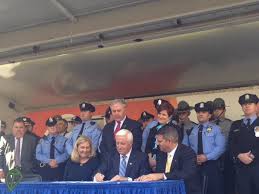
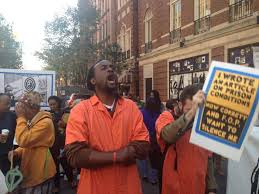
The Revictimization Relief Act (Muzzle Mumia)
Last Thursday, the Pennsylvania State Senate in a bi-partisan 37-11 vote, approved The Revictimization Release Act. This last minute controversial law was ignited by Mumia Abu Jamal’s commencement address delivered at Goddard College in Vermont. The law would grant crime victims or prosecutors acting on their behalf to file a civil action against an offender to seek injunctive relief to stop offenders or former inmates from engaging in conduct that would cause “temporary or permanent state of mental anguish” to the victim.
Mumia Abu Jamal is 60 years old. He’s in the general population at Mahanoy State Correctional Institution in Frackville. He has also given speeches at Evergreen State College in Washington and Antioch College in Ohio.
Attorney Bret Grote:
- The Muzzle Mumia Law as it was called by the Harrisburg Patriot provides a cause of action for a victim of a personal injury crime to sue an offender in state court in Pennsylvania if that offender engages in conduct that “perpetuates” the effect of that crime on the victim. Later on in the statutes, that conduct is defined as including conduct that a temporary or permanent states of mental anguish.
- It also provides for the district attorney where the conviction was secured or the state’s attorney general to essentially act as the private attorney for the victim in order to bring this suit.
- It also does encompass not only speech about the crime whether its somebody like Mumia or Lorenzo Johnson or countless others who speak out about being framed up in Pennsylvania, but it doesn’t even make any exceptions for legal proceedings – and obviously people appealing criminal convictions can cause anguish to others.
- There are standards and no definitions for the conduct that is at issue except in relation to its impact on the victim and to provide some context as I’m sure your listeners know why it was written this way is they needed to write a statute that would sweep so broadly so as to encompass things like Mumia giving a commencement address at Goddard College, which was used as a pretext for whipping up this frenzy at the state legislature.
- It is a prior restraint on the freedom of speech but its written so broadly that Maureen Faulkner or the district attorney could conceivably go into court under this law.
- The House Judiciary committee in discussing this law when it was introduced in committee raised the issue of would this allow a court to enjoin what they called third party vessels.
- It could be Prison Radio, or it could be an individual who is authorized to speak to the media, or make a public statement.
- It was passed 197-0 in the House Legislature, and 37-11 in the Senate.
- It just shows you what takes precedence over any kind of adherence of the Constitution of the state or the United States, more than any law is allegiance to power amongst the political class, Pennsylvania politicians, attorney generals, district attorneys, are no strangers to Constitutional violations, its a normative practice for them.
- Right now, I’m representing Mumia in this and Prison Radio and Robert Holbrook who is a juvenile lifer and Human Rights Coalition member and activist and writer.
- Its unconstitutional under traditional over breadth analysis, it penalized lawful speech and its void for vagueness.
- There is probably nothing that would be more traumatizing for an actual victim of a crime then to have to go through this process that they’ve laid out in the Revictimization Release Act.
- They explicitly and exclusively focused on Mumia.
- This legislation was introduced by a former member of the Fraternal Order of Police, Mike Verib, who was a former Philadelphia police officer now a state legislator. In the context of Mumia’s case they have been leading a lynch mob literally in the streets to snuff out his voice.
- For decades the judge that presided over his trial was a Fraternal Order of Police member. They finance and vet the campaigns of every Supreme Court Justice in the state of Pennsylvania, the same with people running for office as governors.
- Mumia is being used in this context to reestablish the narrative, the Fraternal Order of Police, the police, their political counterparts are righteous protectors of public safety and that they’re beyond question and beyond reproach in trying to reset the propaganda line that has been dislodged in the wake of the rebellions in Ferguson, Illinois.
Guest – Pennsylvania attorney Brete Grote, a member of the Russell Maroon Shoatz legal team and cofounder and legal director of the Abolitionist Law Center. Bret has worked with the Human Rights Coalition since 2007 as an investigator, organizer, and researcher. He was the Isabel and Alger Hiss Racial Justice Fellow at the Center for Constitutional Rights in 2012. He graduated from the University of Pitt Law School in May 2013 and was recognized as the school’s Distinguished Public Interest Scholar.
——-

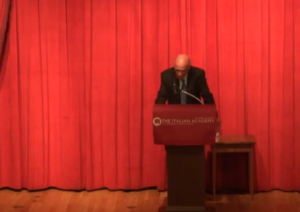
Richard Falk: The Palestinian Future After Gaza
We hear a presentation by Richard Falk titled The Palestinian Future After Gaza. Richard Falk was presenting at the Edward W. Said Memorial Lecture, co-sponsored by Columbia’s Heyman Center for the Humanities. It’s given once a year in honor of the public intellectual and literary critic, Edward W. Said, who taught in the English & Comparative Literature Department at Columbia from 1963 until 2003
Richard Falk is Albert G. Professor of International Law and Practice Emeritus at Princeton where he was a member of the faculty for 40 years. Since 2002 he has been associated with Global & International Studies at University of California, Santa Barbara as a research professor.
He was Special Rapporteur on Occupied Palestine for the UN Human Rights Council since 2008, and served on a panel of experts appointed by the President of the UN General Assembly, 2008-2009. He is Chair of the Board of Directors, Nuclear Age Peace Foundation, an NGO located in Santa Barbara.
He is also a member of the editorial board of several journals and magazines, including the American Journal of International Law, Third World Quarterly, Globalizations, The Nation, and The Progressive. Formerly, he was for many years North American Director of the World Order Models Project.
————————————————————————–
CIA Sponsored Terror, Civil Liberties, Criminalizing Dissent, Guantanamo, Habeas Corpus, Human Rights, Military Tribunal, Surveillance, Targeting Muslims, Torture, Truth to Power, War Resister
Podcast: Play in new window | Download
Updates:
- Heidi Boghosian Updates Listeners On The Revictimization Relief Act
——
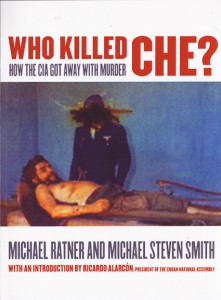

Michael Smith Returns From Argentina Book Tour
Early October marks the 47th anniversary of Ernesto Che Guevarra’s capture and assassination in Bolivia. Co-hosts Michael Ratner and Michael Smith have authored the book Who Killed Che? How The CIA Got Away With Murder. Michael Smith has recently returned from a trip to Buenos Aires to promote the Spanish language version of the book. Michael explains how Che was a threat to the United States by helping Cuba take over their own economy and why its important to set the story straight about Che’s death. Review of Who Killed Che?
—–
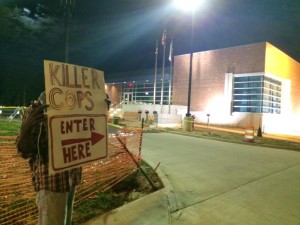
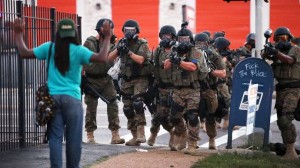
Weekend of Resistance: Ferguson, St. Louis Protests and the National Lawyers Guild
Last weekend, thousands of protesters in Ferguson, Missouri just outside of St. Louis demonstrated during a long planned Weekend of Resistance to the militarized suppression of peaceful demonstrations against the the killings of unarmed black teenagers including Michael Brown two months ago. Demonstrators traveled from cites across the country to participate in protests against police violence – including sit ins and vigil marches. Meanwhile, National Lawyers Guild members have been providing legal support, legal observation and felony representation for people arrested during the weekend. We catch up with St Louis Lawyers Guild member attorney Maggie Ellinger-Locke who has been working long hours representing arrested demonstrators. There are 90 municipalities in St. Louis and Maggie also explains the challenges in helping those arrested get processed through a unique court system.
Attorney Maggie Ellinger-Locke:
- People poured into the streets after the killing of Mike Brown and have pretty much been occupying various locations around the St. Louis area and protesting ever since.
- We at the National Lawyers Guild have mobilized close to 100 legal observers at this point to come down and do the observing and training people who are local.
- We’ve also been connecting people who are facing felony charges with representation as well as backing up the Arch City Defenders who are handling the bulk of the ordinance violations and charges.
- In August there were lots of chemical weapons used, tear gas every night. I was tear gassed multiple times. Other major mobilizations that I’ve been to, they last a couple of days, maybe the duration of a week, but this has been a continued onslaught of less than lethal weapons.
- There are a lot of difference agencies on the ground for law enforcement. There’s the Missouri Highway Patrol, St. Louis County Police Department, The Sheriff’s Department and of course we have 90 different municipalities in St. Louis County, each with its own police force.
- This is what it takes to fight back. People are out there every day on the streets.
- We’ve had NLG members pour in from all over which has really been fun getting to know all these people.
- Monsanto, which is based in Creve Coeur, Missouri, made a donation recently of a million dollars to various community groups doing work on the ground. On the other hand we’ll have a local pizza company board up and then the owner will train a gun on protesters to intimidate them.
- The demands have varied depending on the organizations. Indicting Darren Wilson, the officer who shot Michael Brown is at the top of everyone’s list. In order to achieve that you would have to have demand number 2 met which is that Don McCullough, the St. Louis County prosecuting attorney recuse himself from this case. People think that he’s conflicted in that his father was a white police officer who was shot by an African American man and killed.
- Another big demand is that the many many municipal charges that people are facing be dropped.
- In addition we desperately need reform of our municipal court system. The structure is insane.
- We’re hopeful that if we can demand jury trials for all of those arrested, we may in fact be able to crash the system.
- We have 40 people now who are facing felonies.
- The Organization For Black Struggle and Missourians Organizing for Reform and Empowerment.
Guest – Attorney Maggie Ellinger-Locke, National Lawyers Guild member and activist, and a partner with Ellinger & Assoc., P.C., a Law Firm in O’Fallon, Missouri.
——-
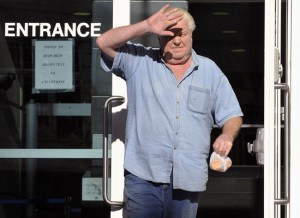
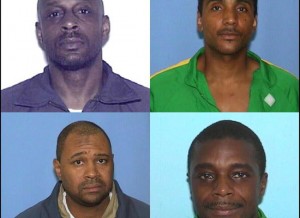
Jon Burge, Torturer of Over 100 Black Men, is Out of Prison After Less Than 4Years
Last week former Chicago police commander Jon Burge who was convicted of lying about torturing more than 100 African-American men at Chicago police stations will be released from the Butner Correctional Institution and reporting to a halfway house in Tampa, Florida. This, as many listeners know is an ongoing story that we’ve been reporting on for many years with Attorney Flint Taylor with the People’s Law Office in Chicago who worked on the case representing some of the torture victims. We talk about why Jon Burge was released and his recent article titled Jon Burge, Torturer of Over 100 Black Men, is Out of Prison After Less Than Four Years. Flint reminds listeners that the total in financial damages to taxpayers from the torture of over 100 black men that Burge oversaw, and the ongoing pension payouts to his collaborating officers, exceeds $120,000,000.
Attorney Flint Taylor:
- Burge is a now notorious police torturer here in Chicago. He shot from detective up to commander of a police station based on torturing African-Americans suspects into giving confessions and sending many of them to death row and to life in prison.
- Ultimately, we were, along with community activists, expose this pattern and practice of 100 cases of police torture.
- This was by electric shock, by bagging people and other kinds of racist brutality.
- We exposed it and nothing happened for many years. Ultimately the Feds, indicted Burge, several years ago, not for torture because the statute of limitations had run on that, but rather for perjury and obstruction of justice.
- He was convicted by a predominantly white jury and ultimately sentenced to 41/2 years in the penitentiary.
- After 31/2 years, he was permitted to go to a halfway house for 6 months.
- What’s happening now? What’s happening with regard to the men who are still in the penitentiary, decades later, and there are almost 20 of them, based on tortured confessions.
- How about the men who testified against Burge, who were his victims?
- Those men, unlike Burge who gets a pension now, and the Illinois Supreme Court has upheld his right, even as a convicted felon to collect that money. These men get nothing, have nothing.
- There are as many as 90 of those men on the streets now, with no health care, with no treatment for psychological damage.
- The majority of city council members support at this point reparations for those men. The reparations for those men would be 20 million dollars.
- The same amount of the money the city spent to defend Burge in the cases of the exonerated men.
- We’re now at a sensitive stage, where the mayor, Emanuel has had to come out. He’s no friend to the anti-torture forces, and he’s been asked repeatedly on this.
- He has played both sides against the middle, its time right now where he’s going to have to fish or cut bait.
- We had the strong support of Karen Louis who was a wonderful challenger and she has now had to withdraw from the (mayoral) race because of “health issues.” She was a strong supporter of the reparations ordinance.
Guest – Attorney G. Flint Taylor, a graduate of Brown University and Northwestern Law School, is a founding partner of the People’s Law Office in Chicago, an office which has been dedicated to litigating civil rights, police violence, government misconduct, and death penalty cases for more than 40 years.
——————————————————————————

Please help support Law and Disorder, the show is now a sponsored project of Fractured Atlas, a non-profit arts service organization. Contributions for the charitable purposes of Law and Disorder must be made payable to Fractured Atlas only and are tax-deductible to the extent permitted by law.
Afghanistan War, CIA Sponsored Terror, Civil Liberties, Criminalizing Dissent, Gaza, Guantanamo, Habeas Corpus, Human Rights, Iraq War, NSA Spying, Political Prisoner, Prison Industry, Surveillance, Targeting Muslims, Torture, Truth to Power, War Resister
Podcast: Play in new window | Download
Updates:
- Mumia Spurs Bill To Block Publicity-Seeking Criminals (Son of Sam Law)
- Guantanamo Bay Prisoner Files Historic Lawsuit Against Obama Over Force-Feeding
——

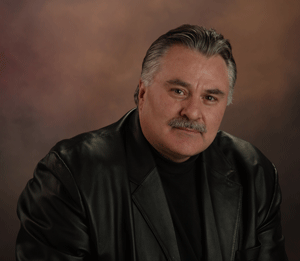
Lawyers You’ll Like – Charlie Abourezk
As part of our Lawyers You’ll Like series, we talk with attorney Charles Abourezk about his work with the Native American community in South Dakota. Charles is a trial attorney, author and film maker. His documentary A Tattoo On My Heart: The Warriors of Wounded Knee 1973 is a gripping documentation of those American Indian men and women involved in the siege. Charles is the Chief Justice of the Rosebud Sioux Tribe Supreme Court, he’s also member of South Dakota Advisory Committee to U.S. Commission on Civil Rights. He’s the son of James George Abourezk, former Democratic United States Representative and United States Senator where he was generally viewed as critical of US foreign policy in Israel and Palestinian.
Attorney Charlie Abourezk:
- The Rosebud Sioux Tribe is the second largest tribe in South Dakota. There are nine total tribal governments in the state. It’s where I grew up.
- I spent most of my adult life on the Pine Ridge Reservation which has been the poorest county in the United States.
- I went to law school, long after I worked for a number of Indian organizations including a Native American NGO that worked at the UN in Category 2 status.
- The Pine Ridge Reservation is the second largest reservation in the United States, located in south western South Dakota. It’s a huge land mass, takes about an hour and a half to drive diagonally across the reservation. There’s very little economy. The geography is very poor, it lends itself to cattle grazing but not much in terms of raising crops.
- Wounded Knee was the site of the 1890 massacre in which almost 300 American Indians from several different tribes were killed by the U.S. Army. They were surrounded and essentially murdered on that spot.
- So, in 1973, there had been a lot of racial discrimination and racially motivated killings of Indian people, the American Indian Movement returned and joined forces with the traditional people who had long been neglected on the reservation.
- As a result they decided to engage in a protest. They chose the site of the massacre at Wounded Knee, to stage that protest.
- They set up sort of a line there, with the government and US Marshalls, along with Dick Wilson’s followers who were armed and were called the goon squad and formed the other side of that line. The siege lasted 71 days.
- It finally dismantled and number of people were prosecuted as a result of that.
- At Wounded Knee, two Indian people killed and one Marshall wounded.
- We set up a recording studio right at the Wounded Knee school, and just took people’s stories. I did the interviews, they were really powerful. There were some stories that didn’t fit with the arc of the film but were incredible. I’m glad I documented it then, because I think of the people in the documentary, 7 or 8 have now passed away.
- I continue to be a strong advocate for tribal sovereignty, self determination and the rights of individuals especially within the dynamic of racial discrimination which at times in South Dakota have been as bad as the south is toward African Americans.
- I helped affirm and preserve the boundaries of the Yankton Sioux Reservation, that went up to the Supreme Court twice. I was the lead council when it finally concluded, we were able to win that one.
- I was a former Supreme Court Justice on the Pine Ridge Reservation for their Supreme Court and I retired from that position.
- Except for limited jurisdiction the Federal Government had on criminal matters, the civil jurisdiction for incidents which occur within the reservation lie with the tribal court as do criminal misdemeanors for tribal members and non tribal members meaning Indians from other tribes that happen to be living on the reservation.
- In the Native American view you can’t really have winners and losers, you have to try to restore the harmony or the balance within the tribe.
- The American government adopted the British style of colonialism as did the Israelis when they began to colonize parts of Palestine. It kind of goes in 4 steps.
- A disruption of traditional agriculture and food gathering, which out here was done in two ways, killing off the buffalo and secondly constraining them from moving around in a wide arc for hunting and gathering – by putting them on the reservation they stopped that.
- Transfer commonly owned land into private ownership, to turn land into a commodity that can be bought and sold. They did that through what’s called the Daws Act or the Allotment Act in the late 1800s.
- Theodore Roosevelt called that act a “might pulverizing machine” with which to break up the tribal mass.
- The third step was to develop a native ruling elite. In this case they first developed “paper chiefs” then in the 1930s developed modern tribal government.
- Last step, develop an educated elite. Of course any colonizer anywhere, that’s the step that always back fires.
- The American Indian Movement was born from the children of the parents who were relocated into cities trained as workers.
- They were the ones who came back home and joined forces with the traditional people and stood up against racism and in favor of tribal sovereignty and tribal self determination.
- You see many parallels with that and what’s happening to the Palestinians in the West Bank and Gaza. Dr William Julius Wilson
Guest – Charlie Abourezk, from Rapid City, South Dakota and is a trial attorney, longtime activist and community organizer in the native American community in South Dakota. He is also a documentary film maker, his most recent is the feature length documentary “A Tattoo On My Heart: The Warriors of Wounded Knee 1973” which played on public television stations around the United States. He is the current Chief Justice of the Rosebud Sioux Tribe’s Supreme Court and a member of the South Dakota Advisory Committee to the US Commission on Civil Rights. His client base is made up largely of Native Americans, tribal schools and Indian tribal governments, but he also represents plaintiffs in civil rights litigation. He will have a book coming out this next year entitled “A Mighty Pulverizing Machine: The Continuing Colonization of American Indians.”
——-
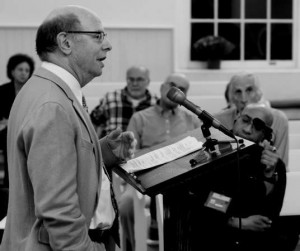
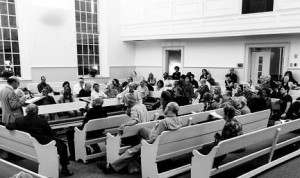
From Guantanamo to Wikileaks: Taking on the State In a Post 9/11 World.
Our own Michael Ratner, President Emeritus, Center for Constitutional Rights (CCR), past president, National Lawyers Guild; Chair, European Center for Constitutional and Human Rights delivered a talk last week titled ‘From Guantanamo to Wikileaks: Taking on the State In a Post 9/11 World.’ Michael was honored with a PathMaker to Peace Award by the Brooklyn For Peace Organization for his consistent work in litigation against government spying and surveillance of activists including the targeting of Muslims particularly after 9/11.
Law and Disorder Co-host Attorney Michael Ratner, President Emeritus of the Center for Constitutional Rights (CCR), a non-profit human rights litigation organization based in New York City and president of the European Center for Constitutional and Human Rights (ECCHR) based in Berlin. Ratner and CCR are currently the attorneys in the United States for publishers Julian Assange and Wikileaks. He was co-counsel in representing the Guantanamo Bay detainees in the United States Supreme Court, where, in June 2004, the court decided his clients have the right to test the legality of their detentions in court. Ratner is also a past president of the National Lawyers Guild and the author of numerous books and articles, including the books Who Killed Che? How the CIA Got Away With Murder, The Trial of Donald Rumsfeld: A Prosecution by Book, Against War with Iraq and Guantanamo: What the World Should Know, as well as a textbook on international human rights.
———————————————————————————-

Please help support Law and Disorder, the show is now a sponsored project of Fractured Atlas, a non-profit arts service organization. Contributions for the charitable purposes of Law and Disorder must be made payable to Fractured Atlas only and are tax-deductible to the extent permitted by law.



























